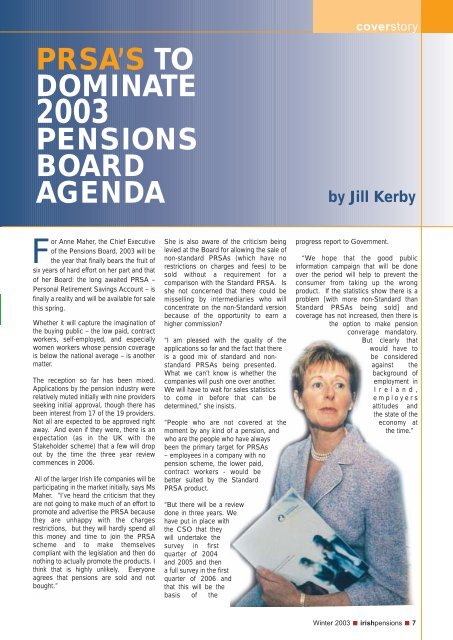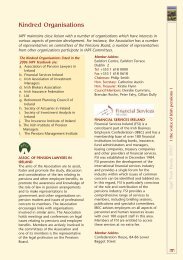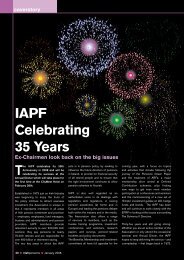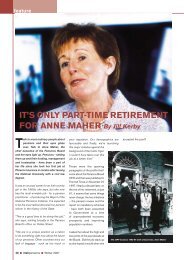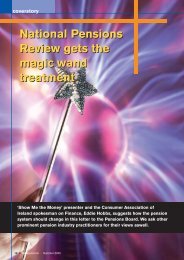Interview with Anne Maher of the Pensions Board - Jill Kerby - Irish ...
Interview with Anne Maher of the Pensions Board - Jill Kerby - Irish ...
Interview with Anne Maher of the Pensions Board - Jill Kerby - Irish ...
Create successful ePaper yourself
Turn your PDF publications into a flip-book with our unique Google optimized e-Paper software.
coverstoryPRSA’S TODOMINATE2003PENSIONSBOARDAGENDAby <strong>Jill</strong> <strong>Kerby</strong>For <strong>Anne</strong> <strong>Maher</strong>, <strong>the</strong> Chief Executive<strong>of</strong> <strong>the</strong> <strong>Pensions</strong> <strong>Board</strong>, 2003 will be<strong>the</strong> year that finally bears <strong>the</strong> fruit <strong>of</strong>six years <strong>of</strong> hard effort on her part and that<strong>of</strong> her <strong>Board</strong>: <strong>the</strong> long awaited PRSA –Personal Retirement Savings Account – isfinally a reality and will be available for salethis spring.Whe<strong>the</strong>r it will capture <strong>the</strong> imagination <strong>of</strong><strong>the</strong> buying public – <strong>the</strong> low paid, contractworkers, self-employed, and especiallywomen workers whose pension coverageis below <strong>the</strong> national average – is ano<strong>the</strong>rmatter.The reception so far has been mixed.Applications by <strong>the</strong> pension industry wererelatively muted initially <strong>with</strong> nine providersseeking initial approval, though <strong>the</strong>re hasbeen interest from 17 <strong>of</strong> <strong>the</strong> 19 providers.Not all are expected to be approved rightaway. And even if <strong>the</strong>y were, <strong>the</strong>re is anexpectation (as in <strong>the</strong> UK <strong>with</strong> <strong>the</strong>Stakeholder scheme) that a few will dropout by <strong>the</strong> time <strong>the</strong> three year reviewcommences in 2006.All <strong>of</strong> <strong>the</strong> larger <strong>Irish</strong> life companies will beparticipating in <strong>the</strong> market initially, says Ms<strong>Maher</strong>. “I’ve heard <strong>the</strong> criticism that <strong>the</strong>yare not going to make much <strong>of</strong> an effort topromote and advertise <strong>the</strong> PRSA because<strong>the</strong>y are unhappy <strong>with</strong> <strong>the</strong> chargesrestrictions, but <strong>the</strong>y will hardly spend allthis money and time to join <strong>the</strong> PRSAscheme and to make <strong>the</strong>mselvescompliant <strong>with</strong> <strong>the</strong> legislation and <strong>the</strong>n donothing to actually promote <strong>the</strong> products. Ithink that is highly unlikely. Everyoneagrees that pensions are sold and notbought.”She is also aware <strong>of</strong> <strong>the</strong> criticism beinglevied at <strong>the</strong> <strong>Board</strong> for allowing <strong>the</strong> sale <strong>of</strong>non-standard PRSAs (which have norestrictions on charges and fees) to besold <strong>with</strong>out a requirement for acomparison <strong>with</strong> <strong>the</strong> Standard PRSA. Isshe not concerned that <strong>the</strong>re could bemisselling by intermediaries who willconcentrate on <strong>the</strong> non-Standard versionbecause <strong>of</strong> <strong>the</strong> opportunity to earn ahigher commission?“I am pleased <strong>with</strong> <strong>the</strong> quality <strong>of</strong> <strong>the</strong>applications so far and <strong>the</strong> fact that <strong>the</strong>reis a good mix <strong>of</strong> standard and nonstandardPRSAs being presented.What we can’t know is whe<strong>the</strong>r <strong>the</strong>companies will push one over ano<strong>the</strong>r.We will have to wait for sales statisticsto come in before that can bedetermined,” she insists.“People who are not covered at <strong>the</strong>moment by any kind <strong>of</strong> a pension, andwho are <strong>the</strong> people who have alwaysbeen <strong>the</strong> primary target for PRSAs– employees in a company <strong>with</strong> nopension scheme, <strong>the</strong> lower paid,contract workers - would bebetter suited by <strong>the</strong> StandardPRSA product.“But <strong>the</strong>re will be a reviewdone in three years. Wehave put in place <strong>with</strong><strong>the</strong> CSO that <strong>the</strong>ywill undertake <strong>the</strong>survey in firstquarter <strong>of</strong> 2004and 2005 and <strong>the</strong>na full survey in <strong>the</strong> firstquarter <strong>of</strong> 2006 andthat this will be <strong>the</strong>basis <strong>of</strong> <strong>the</strong>progress report to Government.“We hope that <strong>the</strong> good publicinformation campaign that will be doneover <strong>the</strong> period will help to prevent <strong>the</strong>consumer from taking up <strong>the</strong> wrongproduct. If <strong>the</strong> statistics show <strong>the</strong>re is aproblem [<strong>with</strong> more non-Standard thanStandard PRSAs being sold] andcoverage has not increased, <strong>the</strong>n <strong>the</strong>re is<strong>the</strong> option to make pensionconverage mandatory.But clearly thatwould have tobe consideredagainst <strong>the</strong>background <strong>of</strong>employment inIreland,employersattitudes and<strong>the</strong> state <strong>of</strong> <strong>the</strong>economy at<strong>the</strong> time.”Winter 2003 irishpensions 7
coverstoryAsked whe<strong>the</strong>r she thought making public<strong>the</strong> results <strong>of</strong> any surveys into <strong>the</strong> volume<strong>of</strong> Standard versus non-Standard PRSAsales should be considered Ms <strong>Maher</strong>said, “I suppose this would be usefulinformation.“I think it will become fairly obvious, fairlyquickly, if <strong>the</strong>re is a problem in <strong>the</strong> sale <strong>of</strong><strong>the</strong> PRSAs. Requiring Standard and nonStandard quotes to be presentedtoge<strong>the</strong>r at point <strong>of</strong> sale may have beenone way to try and prevent misselling.But if a sales person genuinely wants tomis-sell, even if <strong>the</strong>y are required topresent two quotes, <strong>the</strong>y are still alone<strong>with</strong> <strong>the</strong> customer and may be able toconvince <strong>the</strong>m to buy <strong>the</strong> more expensiveone. And while it might be a good idea tomake <strong>the</strong>m present both cases, I can’tsee that in itself it would preventmisselling.”The summer <strong>of</strong> 2003 will certainly bedominated by all things PRSA-related, forthis is when <strong>the</strong> <strong>Pensions</strong> <strong>Board</strong>’s half amillion euro advertising and promotioncampaign will get under-way, but <strong>the</strong>re area number <strong>of</strong> o<strong>the</strong>r pressing issues for <strong>the</strong><strong>Board</strong>.Simplifying <strong>the</strong> increasingly complicatedpension scene is an on-going issue inwhich <strong>the</strong> <strong>Board</strong> is working closely <strong>with</strong><strong>the</strong> Revenue and o<strong>the</strong>r industrypractitioners, including <strong>the</strong> IAPF.Proposals to standardise pensioncontributions to <strong>the</strong> various pensionschemes are <strong>with</strong> <strong>the</strong> Revenue and shehopes that <strong>the</strong>y will be addressed asamendments to <strong>the</strong> Finance Act.“It was originally envisaged by <strong>the</strong> originalNPPI proposal that <strong>the</strong>re would eventuallyonly be two pension systems in place –<strong>the</strong> occupational system and PRSAs.The difficulty is that when something isalready in place, it is hard to take it away,especially when <strong>the</strong>re are alwaysindividuals who want <strong>the</strong> existing systemto remain.“We did touch on <strong>the</strong> bigger issue <strong>of</strong>whe<strong>the</strong>r we should move in Irelandtowards principle-based regulation ra<strong>the</strong>rthan prescriptive-based regulation, but itcan’t be done overnight. On <strong>the</strong> one handwe are all conscious <strong>of</strong> <strong>the</strong> need tosubscribe to a more simplified pensionregime, yet in practice we are also issuingall sorts <strong>of</strong> new regulations and legislationbecause <strong>of</strong> <strong>the</strong> introduction <strong>of</strong> PRSAs. Iaccept that it all adds to complexity. “The simplification <strong>of</strong> pensions is “easy”,she concedes, “only when you start <strong>with</strong> agreen field.”<strong>Anne</strong> <strong>Maher</strong>, Chief Executive Officer and Gráinne Clohessy, Chairperson,The <strong>Pensions</strong> <strong>Board</strong>.NOT EXCESSIVEShe vehemently denies that <strong>the</strong> cost <strong>of</strong> all<strong>the</strong> new regulation and supervision <strong>of</strong>PRSAs, which is raised on a once-<strong>of</strong>f and<strong>the</strong>n per-product basis from <strong>the</strong> providersis excessive. The system adopted here isfairer than <strong>the</strong> UK one, she says, and“judging by <strong>the</strong> strong level <strong>of</strong> applicationsfor approval so far has clearly not put <strong>of</strong>fproviders.” Ei<strong>the</strong>r way, she says <strong>the</strong>charges that are being levied are still notsufficient to meet all <strong>the</strong> Pension <strong>Board</strong>’sadditional costs or <strong>the</strong> cost <strong>of</strong> promoting<strong>the</strong> new product or <strong>the</strong> on-goingeducation and information campaign <strong>the</strong><strong>Board</strong> hopes to undertake.There is no one more aware than <strong>Anne</strong><strong>Maher</strong> about how difficult and how timeconsuming it will be to convince ordinaryworkers - and more employers - to makegreater provision for <strong>the</strong>ir retirement.They will start <strong>the</strong> campaign by focussingon individuals – “telling <strong>the</strong>m aboutpensions and why <strong>the</strong>y should have oneand how to go about it” – as well as <strong>with</strong>employers, “who are <strong>the</strong> best conduit fordelivering PRSAs and how <strong>the</strong>y cancomply <strong>with</strong> <strong>the</strong>ir requirement to provideaccess to a PRSA for <strong>the</strong>ir employees.”After providing employer informationpacks, <strong>the</strong>y will spread <strong>the</strong>ir budgetfur<strong>the</strong>r into <strong>the</strong> community in <strong>the</strong> form <strong>of</strong>seminars and o<strong>the</strong>r information sessionsand eventually to try and get <strong>the</strong> messageacross to youngsters in school about <strong>the</strong>merits <strong>of</strong> early pension saving.“This campaign has to be ongoing – weenvisage at least a three year period –Also as part <strong>of</strong> <strong>the</strong> campaign we want totake <strong>the</strong> message to younger people inschools. There is some evidence thatyoung workers who were earning highsalaries were making contribution for <strong>the</strong>tax relief.”The fact that <strong>the</strong> SSIA scheme was leftuntouched in <strong>the</strong> last Budget didn’t do <strong>the</strong>PRSA cause much good, concedes Ms<strong>Maher</strong>, but SSIA’s have encouraged asavings culture again. “PRSAs are not soeasy to explain as SSIAs,” she says, “<strong>the</strong>yare more complicated, what <strong>with</strong> <strong>the</strong>tax relief and <strong>the</strong> different fundingcontributions. But PRSAs may ultimatelybenefit from <strong>the</strong> SSIAs if people can beencouraged to redirect <strong>the</strong>ir funds intoone when <strong>the</strong>ir SSIA matures.“But this campaign isn’t just about gettingpeople to take out a PRSA. There is awider issue <strong>of</strong> funding adequacy. Wehave to also get <strong>the</strong> message across thatputting 5% into a pension and youremployer putting ano<strong>the</strong>r 5% is just notenough to provide for a satisfactorypension income. “FUNDING STANDARDSWhich leads to <strong>the</strong> o<strong>the</strong>r key issue that <strong>the</strong><strong>Board</strong> are already monitoring closely -funding standards <strong>with</strong>in existing DBschemes. Three years <strong>of</strong> falling stockmarket returns have tipped somecompanies over <strong>the</strong> point where <strong>the</strong>irfunds may not meet all <strong>the</strong>ir obligations if<strong>the</strong>y were to be wound up. With <strong>the</strong>economy faltering and more companiesclosing it is a growing worry.“We are committed to idea that schememembers be fully aware <strong>of</strong> <strong>the</strong> state <strong>of</strong>8 irishpensions Winter 2003
<strong>the</strong>ir schemes,” she says, “which is whywe will be recommending to <strong>the</strong> Ministerthat part <strong>of</strong> <strong>the</strong> <strong>Pensions</strong> Act whichrequires that an intervaluation statementby actuaries every year be introduced as apriority. There is no point in people sittingin DB schemes thinking everything is finewhen it clearly isn’t.“We also need to ensure that membersbecome more aware that nothing isabsolutely guaranteed and that <strong>the</strong>irpensions are dependent on <strong>the</strong> state <strong>of</strong><strong>the</strong> funds and that sometimes things cango wrong. But that is also why <strong>the</strong> fundingstandard is being reviewed.“If we continue to enforce <strong>the</strong> windupfunding standard as it is, it could giveemployers an excuse for getting out <strong>of</strong>pensions altoge<strong>the</strong>r. Many could say, whyput a lot <strong>of</strong> money into <strong>the</strong> fund to shore itup for <strong>the</strong> short term, when <strong>the</strong> advice weare getting is that in <strong>the</strong> long run it isn’tnecessary,” she says.“The system has served us well up to now.In <strong>the</strong> short term , hopefully we can worktowards giving people a bit more time toget <strong>the</strong>ir funding up to standard.“Unlike <strong>the</strong> UK however, where not only areDB schemes being closed to newmembers, being converted into DCschemes, or closed altoge<strong>the</strong>r, <strong>the</strong>re ismuch less evidence <strong>of</strong> such action inIreland. The impact <strong>of</strong> FRS17 in <strong>the</strong> UK on<strong>the</strong> closure <strong>of</strong> DB schemes cannot beexaggerated, she says, but is not havingany similar effect here, where pensionschemes, were, for <strong>the</strong> most part, betterfunded.VIABILITYHowever, she concedes that many <strong>Irish</strong>employers, reading about <strong>the</strong> UK situationare asking a lot <strong>of</strong> questions about <strong>the</strong>continuing viability <strong>of</strong> <strong>the</strong> companypension, both from a cost and resourcesperspective. If <strong>the</strong>re is any shift here, shesays, it could very well be in favour <strong>of</strong> <strong>the</strong>simpler, less complicated PRSA system.The <strong>Pensions</strong> <strong>Board</strong> will be keeping aclose eye on movement from conventionalpension schemes into PRSA ones, shesays, where <strong>the</strong>re is no obligation on <strong>the</strong>employer’s part to make any contributionto <strong>the</strong> accounts.“We are concerned that employers maytry to sell <strong>the</strong> idea <strong>of</strong> a PRSA scheme[instead <strong>of</strong> <strong>the</strong> existing DB or DC one] oncoverstory<strong>the</strong> grounds that PRSA are “better”because, for one thing, you aren’t tied intoannuities at retirement.“Mind you,” she adds, “if you look at somepeople who took out Approved RetirementFunds instead <strong>of</strong> pension annuities twoyears ago, you might come across somevery sad stories about how <strong>the</strong>ir fundshave performed. Annuities are perhapsnot looking like such a bad option in thatlight.” The supervision <strong>of</strong> ARF’s issomething that she expects to discuss<strong>with</strong> IFSRA this year, along <strong>with</strong> <strong>the</strong> level<strong>of</strong> <strong>the</strong> minimum income requirement.Finally, she says that 2003 will also be ayear when compliance levels are finetuned.Expressing satisfaction that levels<strong>of</strong> compliance by companies “weregenerally better than at any previous time”<strong>with</strong> three successful prosecutions, <strong>the</strong>reis still more work to be done in this criticalarea, she says.“I think a lot <strong>of</strong> credit however, has to goto practitioners and administrators whohave been working very hard in recentyears to make sure that <strong>the</strong>y and <strong>the</strong>irclients are taking this responsibility veryseriously.”


